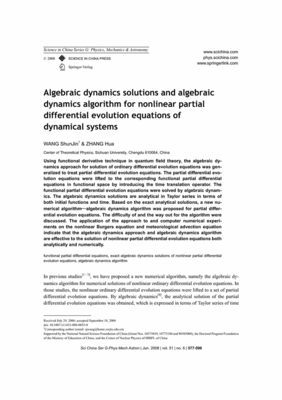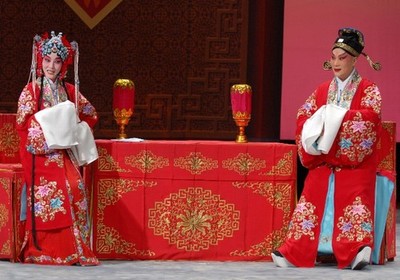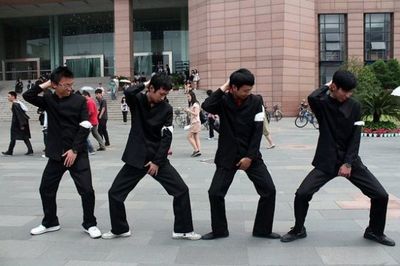(1)力学的分支,考察物体在力的作用下所产生的运动。
The branch of mechanics concerned with the motion of bodies underthe action of forces
(2)考察力或变化的科学分支。(如化学反应动力学)
The branch of any science in which forces or changes areconsidered, - chemical dynamics
(3)对于一个系统或过程中,能够刺激生长、发育或变化的力或属性。(如the dynamics of changing socialrelations)
The forces or properties that stimulate growth, development, orchange within a system or process. - the dynamics of changingsocial relations
(4)乐器不同部件中音量的变化。
The varying levels of volume of sound in different parts of amusical performance.
在网络中,和2、3相近的意思有:
(1)在物理学领域中,研究运动起因或运动中变化的原因的科学叫做动力学。换而言之,动力学是研究力的科学,是试图解释为什么物体会处于运动状态的科学。
In the field of physics, the study of the causes of motion andchanges in motion is dynamics. In other words, the study of forcesand why objects are in motion.
(2)dynamical或dynamic,形容词。形容有(执行)力的、强硬的、坚强的品格,如a dynamicspeaker(也可翻译做电动扬声器,但此处应该做一个富有激情的演说者之类理解),公司的强有力的总裁(the dynamicpresident of the firm)。
dynamical - dynamic: characterized by action of forcefulness orforce of personality; "a dynamic market"; "a dynamic speaker"; "thedynamic president fo the firm".
(3)动力学系统的概念是描述一个点周围空间中位置的时间依赖性的固定规律的数学形式。
The dynanmical system concept is a mathematical formalization forany fixed "rule" which describes the time dependence of a point'sposition in its ambient space.
(4)描述物体在空间中相互作用和运动的方式。
The way that objects interact and move in space.
(5)幅度的变化
variations in amplitude
(6)从生物力学的角度描述运动中的人体
The biomechanical aspects of the human body in motion.
(7)一般而言,任何产生或影响运动的力。在航务气象学中,动力学通常是专指产生大气垂直运动的力。
Generally, any forces that produce motion or affect change. Inoperational meteorology, dynamics usually refer specifically toforces that produce vertical motion in the atmosphere.
Dynamic是一个形容词,在词典中,是指:
(1)形容一个过程或一个系统中,具有恒定的变化、活动或进展
(of a process or system) Characterized byconstant change, activity, or progress. - a dynamiceconomy
(2)形容一个人,具有积极的态度,充满活力和新鲜的想法。
(of a person) Positive in attitude and fullof energy and new ideas. - She's dynamic anddetermined.
(3)形容一件东西,能够促进发展、发育或进展。
(of a thing) Stimulating development orprogress. - the dynamic forces of nature
(4)形容能够产生运动的力,或者与之相关的力。
Of or relating to forces producingmotion
(5)形容一个动词,能够表达出动作、活动、事件或过程
(of a verb) Expressing an action, activity,event, or process
(6)形容一种记忆装置,需要通过周期性的电压施加来达到刷新的目的。
(of a memory device) Needing to be refreshedby the periodic application of a voltage
(7)形容通过语音、乐器或录音设备所产生的音量,或与之相关的。
Of or relating to the volume of soundproduced by a voice, instrument, or sound recordingequipment
(8)和产生音量的乐器、声音或录音设备有关的。
Relating to the volume of sound produced byan instrument, voice, or recording. - an astounding dynamicrange.
考察dynamic和dynamical的区别,我发现原来很多人也搞不清楚,而在词典中,这两个词经常是混用的。当然Dynamic还可以是一个名词而Dynamical只能是一个形容词。Dynamic做名词时,其实就是dynamics的单数形式,表示一种基本的或动态的力,特别是那种导致、促进或影响发育、发展或稳定性的力。
a basic or dynamic force, especially one that motivates, affectsdevelopment or stability, etc.
在另一个词典中,查到dynamics的意思是:
(1)当搭配一个单数形式的动词使用时:在物理中,表示研究处于力(一般是外力)的作用下的系统中的运动和平衡的力学分支。
(used with a singular verb) Physics. The branch of mechanics thatdeals with the motion and equilibrium of systems under the actionof forces, usually from outside the system.
(2)当搭配一个复数动词使用时:在物理或情感道德方面:激发或驱动力。
(used with a plural verb) the motivating or driving forces,physical or moral, in any field.
(3)当搭配一个复数动词使用时:表示增长、变化、发展发育的模式或历史。
(used with a plural verb) the pattern or history of growth, change,and development in any field.
(4)当搭配一个复数动词使用时:乐器音量的变化或层次。
(used with a plural verb) variation and gradation in the volume ofmusical sound.
(5)当搭配一个单数动词使用时,表示精神力学
(used with a singular verb) psychodynamics
 爱华网
爱华网



